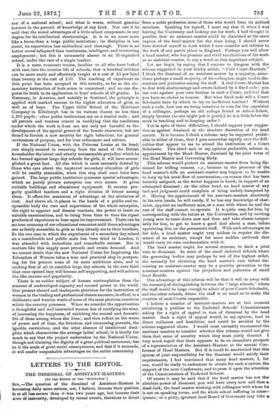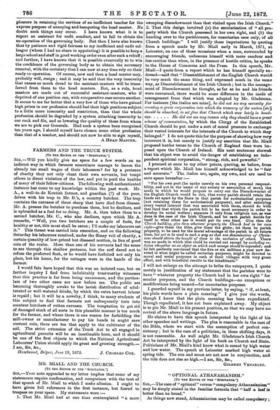LETTERS TO THE EDITOR.
THE DISMISSAL OF ASSISTANT-MASTERS.
[To TEE EDITOR Or TEE "Bram/mai 'Sra.,—The question of the dismissal of Assistant-Masters is becoming daily more serious, not, I believe, because their position is at all lees secure than it was two years ago, but because their sense of insecurity, developed by recent events, threatens to divert
from a noble profession some of those who would form its noblest members. Speaking for myself, I must say that if, when I was
leaving the University and looking out for work, I had thought it
possible that an assistant-master could be dismissed at the mere caprice of the head master for the time being, I should never have devoted myself to work which I now consider not inferior to the work of any parish priest in England. Perhaps you will allow a head master, who has pleasant and vivid recollections of his work as an assistant-master, to say a word on this important subject.
Let me begin by saying that I venture to disagree with the scheme suggested in your kindly article, "Civil Court-Martials."
I think the dismissal of an assistant-master by a majority, some- times perhaps a small majority, of his colleagues, might lead to dis- sensions and jealousies among the staff. A real Court-Martial has to deal with shortcomings and errors defined by a fixed code ; you can vote against your own brother in such a Court, and feel that you have no choice in honour. But what fixed code will a Court Scholastic have by which to try an inefficient teacher? Without such a code, how can we bring ourselves to vote for the expulsion of a colleague, perhaps an old college friend or school-fellow, simply because (as one might put it gently) he is a little below the mark in teaching and in keeping order ?
Yet in spite of these difficulties, I should support your sugges- tion as against dismissal at the absolute discretion of the head master. It is because I think a scheme may be suggested prefer- able to either of these, that I pass somewhat rapidly over the diffi- culties that appear to me to attend the institution of a Court Scholastic. This third and, in my opinion preferable, scheme is, appointment by the Head Master, dismissal by the joint votes of the Head Master and Governing Body.
This scheme would protect an assistant-master from being dis- missed for trifling reasons, e.g., because in the presence of the head master's wife an assistant-master may happen to be unable to keep up his usual flow of conversation,—a reason that has been recently assigned, as the writer happens to know, in support of an attempted dismissal ; on the other hand, no head master of any tact and judgment could complain of being unduly hampered by it. Having the appointment of his assistant-masters absolutely
in his own hands, he will rarely, if he has any knowledge of char- acter, appoint an inefficient man, or a man with whom he and the rest of the staff cannot co-operate. It is quite easy for him, by corresponding with the tutors at the Universities, and by inviting young men to come down now and then and take classes tempor- arily for him, to get to know a good deal about a man, before appointing him on the permanent staff. With such advantages on his side, a bead master ought very seldom to require the dis- missal of an assistant, except for some sudden outbreak that would carry its own condemnation with it.
The head master ought, for several reasons, to have a joint vote in dismissal. In some of the small endowed schools where
the governing bodies may perhaps be not of the highest order, the necessity for obtaining the head master's vote before dis- missing an assistant-master may be a positive protection to the assistant-masters against the prejudices and jealousies of small local Boards.
One advantage of this scheme will be that it will do away with the necessity of distinguishing between the "large schools," where the staff would be large enough to admit of your Courts Scholastic, and the other schools, where the staff is so small as to make the creation of such Courts impossible.
I believe a number of assistant-masters are at this moment circulating a petition to the Endowed Schools' Commieaionere asking for a right of appeal in case of dismissal by the head master. Such a right of appeal would, in my opinion, lead to direct collisions and hostilities, and could be avoided by the scheme suggested above. I would most earnestly recommend the assistant-masters to consider whether this scheme would not give them that sense of security which they most justly demand. I very much regret that there appears to be no immediate prospect of a representation of the Assistant-Masters at the annual Con- ference of Head Masters. But if it could be ascertained that this system of joint responsibility for the dismissal would satisfy their requirements, I feel convinced that many head masters, I, for one, would be ready to endeavour to obtain for such a system the support of the next Conference, and to press it upon the attention of the Commissioners of Endowed Schools.
Of course it may be said that if the head master has not the absolute power of dismissal, you will have every now and then e dead-lock, the head master working with colleagues with whom he is not on speaking terms, and the whole school suffering in conse- quence; or a petty, ignorant local Board of Governors may take n pleasure in retaining the services of an inefficient teacher for the express purpose of annoying and hampering the head master. No doubt such things may occur. I have known what it is to report an assistant for unfit conduct, and to fail to obtain the co-operation of the governing body. But then I have also known that by patience and rigid fairness to my inefficient and unfit col- league (whom I had no share in appointing) it is possible to keep a large school and staff in good working order even after such a rebuff; and further, I have known that it is possible eventually so to win the confidence of the governing body as to obtain the necessary removal, with the certainty that I can now at any time rely on their ready co-operation. Of course, now and then a head master may, probably will, resign ; and it may be said that the very insecurity that causes so much dread to the assistant-masters will be trans- ferred from them to the head masters. But, as a rule, head masters are made out of successful assistant-masters, who if deprived of one position can, with comparative ease secure another. It seems to me far better that a very few of those who have gained high prizes in our profession should feel their high positions subject to a little more insecurity and restriction, than that the whole profession should be degraded by a system attaching insecurity to our rank and file, and so lowering the quality of those from whom we are to pick our Generals. Had such a system been recognised ten years ago, I should myself have chosen some other profession than that of a teacher, and should not now be able to sign myself,
A HEAD MASTER.



































 Previous page
Previous page